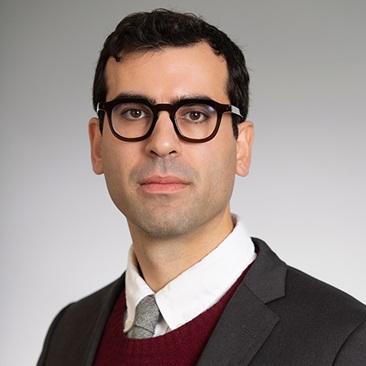Shared Priorities
December 9, 2019
Related:
From Maxwell Perspective...
Shared Priorities
Former Federal Reserve chairman Paul Volcker maintains a long-standing association with Maxwell because he thinks Maxwell does public service right.
By Jeffrey Pepper Rodgers
 Paul Volcker, former chair of the Federal Reserve, at Maxwell in April: Connecting with students at a reception following the Volcker Lecture.
Paul Volcker, former chair of the Federal Reserve, at Maxwell in April: Connecting with students at a reception following the Volcker Lecture."I grew up in an environment where public service was king,” says Paul Volcker, former chairman of the Federal Reserve, sitting in a Maxwell Hall conference room on a spring afternoon. “My father was a city manager. I’ve wound up in public service in one way or another for most of my life, and I think it hasn’t gotten the attention it should get.”
Supporting and improving public service has been a major focus of Volcker for decades, and it’s at the core of his current work with the nonpartisan organization known as the Volcker Alliance. As part of its mission to promote effective government, the Alliance partners with academic institutions to strengthen professional training in public affairs, which is the main agenda for Volcker’s visit to Maxwell. “I wanted to talk with some of the professors and the dean about our common interests,” says Volcker, a member of the Maxwell Advisory Board since 2002. “How can we both be more effective?”
"Everybody likes to talk about the vision. We’re working on the execution."."
Paul Volcker
Volcker, who turns 90 this year, is not a Maxwell alumnus, nor does he have other family or personal history with the University. But his engagement with Maxwell extends back to the 1980s when, following his tenure as Federal Reserve chairman, he led the first National Commission on the Public Service. There were many Maxwell-connected contributors to the commission, including Donna Shalala ’70 MSSc/’70 PhD (SSc) and longtime Maxwell faculty member Patricia Ingraham. During this same period, Volcker met John Palmer, the newly hired dean of Maxwell, and began what Palmer describes as “an ongoing conversation about the state of education for public affairs and the role that the schools were playing, or not playing, in that area.” That led to Volcker joining the Advisory Board and participating in various public policy forums over the years.

Paul Volcker at an earlier meeting with Maxwell faculty members, about public service initiatives.
“How do we do five times the amount of output? It’s all outsourced,” Volcker says. “Are there enough civil servants who are competent in spending 400 billion dollars in the Defense Department alone, and hundreds of billions of dollars in other departments, on outsourcing? Is anybody managing it effectively? Probably not.”
From Volcker’s perspective, Maxwell is an exception to the general trend among universities of paying less and less attention to training future civil servants in how to implement public policy effectively and efficiently.
“When I went to graduate school, they had a whole building devoted to the Harvard School of Public Administration,” he recalls. “They don’t like to use those words anymore. It seems somehow more glamorous to be talking about big political and social issues than the nuts and bolts of administration. But the nuts and bolts are important. Somebody’s got to do it.” The unofficial motto of the Volcker Alliance, taken from Thomas Edison, is “Vision without execution is hallucination.”
“Everybody likes to talk about the vision,” Volcker says. “We’re working on the execution.”
Another Volcker Connection.
Since 2011, Maxwell has been home to the Paul Volcker Chair in Behavioral Economics, thanks to a major gift from SU trustee emeritus Robert Menschel. The chair is held by public finance and tax policy expert Leonard Burman, who also organizes an annual lecture and symposium named for Volcker. This year’s Volcker Lecture featured Christine Jolls, Gordon Bradford Tweedy Professor at Yale Law School.
To illustrate the point, he cites one of the major administrative challenges of this era: outsourcing. Today’s federal workforce is about the same size as when he first worked in an official capacity in the federal government, in 1962 under President Kennedy; yet during this same time span, expenditures have grown by a factor of four to five times, with expansions in defense, Social Security, and other areas.
Schools of public administration and public affairs, Volcker believes, play a crucial role in addressing these kinds of challenges in administration and management. “Maxwell,” he said, “has done a better job of sustaining that focus than any other school.”
Photo Credit, photo of Danielle Thomsen: Steve Sartori, S.U. Photo & Imaging Center
This article appeared in the spring 2017 print edition of Maxwell Perspective; © 2017 Maxwell School of Syracuse University. To request a copy, e-mail dlcooke@maxwell.syr.edu.
Related News
Research

Apr 18, 2024
Commentary

Apr 11, 2024
Commentary

Apr 3, 2024
School News

Mar 13, 2024